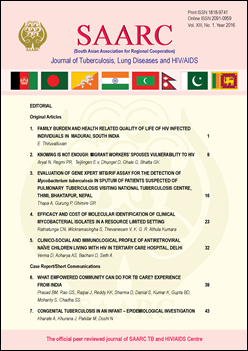Knowing is Not Enough: Migrant Workers’ Spouses Vulnerability to HIV
DOI:
https://doi.org/10.3126/saarctb.v13i1.16923Keywords:
Culture, Sexual Health, Migration, Gender, South AsiaAbstract
Introduction: Male migrants and their sexual partners at home are at increased risk of STIs (Sexually Transmitted Infections) including HIV (Human Immunodeficiency Virus). We aimed to assess the knowledge and attitudes of migrants’ wives regarding HIV and STIs, and to understand risk perception of HIV due to their husbands’ sexual behaviour.
Methodology: A cross-sectional survey among 182 migrants’ wives was conducted in two rural villages of Chitwan district in Nepal. The participants were selected through multistage cluster sampling method and data were collected through a questionnaire administered through a face-to-face interview.
Results: Nearly all (94%) of migrants’ wives had a good knowledge of HIV, however with some misconceptions. More than two-thirds of the participating migrants’ wives were aware about the risk of HIV infection in migrant husbands and subsequent risk of transmitting themselves through sexual intercourse. Nearly half of the participants reported inability to ask their husbands about HIV and STIs even if they had their doubts. Knowledge of HIV and HIV risk associated with migration were statistically significantly higher in younger women, those who were literate and the longer the period of their husbands’ migration.
Conclusion: Despite having generally a good knowledge and awareness of HIV and migration induced HIV risk; migrants’ wives could not discuss sexual health issues with their husbands, thus increasing their vulnerability to HIV and STIs.
SAARC J TUBER LUNG DIS HIV/AIDS, 2016; XIII(1), page: 9-15
Downloads
Downloads
Published
How to Cite
Issue
Section
License
Copyright © SAARC Tuberculosis and HIV/AIDS Centre (STAC), all rights reserved, no part of this publication may be reproduced, stored in a retrieval system or transmitted in any form or by any means without prior permission of the STAC.




